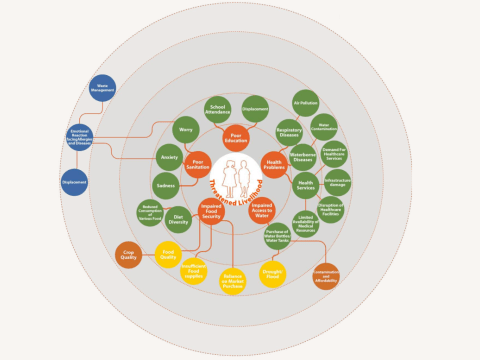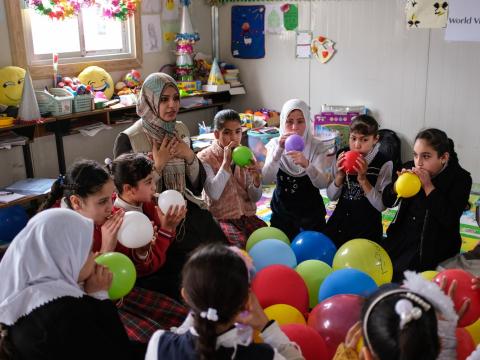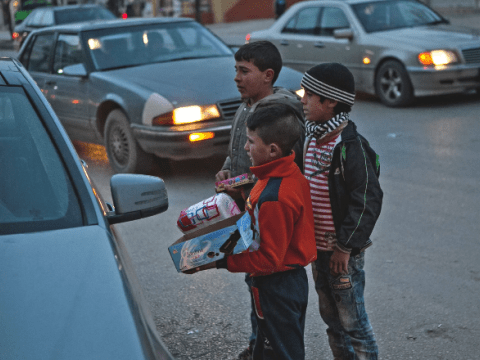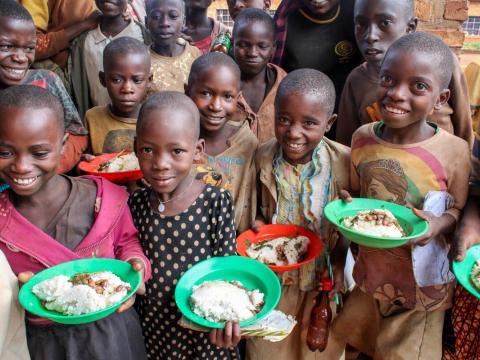
Climate crisis influences children’s and youth’s mental health – why should urban practitioners worry about it?
Aline Rahbany and Kate Kobaidze ask, what does amplifying children's voices on climate change and mental health have to do with World Urban Forum?
1 November, 2024
This year’s World Urban Forum is as vital for child-focused aid and development agencies like ours as it is for the 24,000 urban planners, urban professional, policy makers, and government representatives who are directly involved in designing cities and managing human settlements. Why? Because the urbanisation of poverty, the increase of urban warfare and urban violence, as well as the significant impact of disasters and climate change on urban settings, continue to make children - especially those living in urban slums and informal settlements - the first casualties.
The quadruple threat (urban fragility, climate change, gender inequality and social exclusion) is, more rapidly than ever, driving children deeper into extreme vulnerability. This in turn is pushing World Vision to intensify our urban work and invest more in building urban practitioners’ capabilities as well as increasing our financial commitments for urban programmes.
Violence aggravating urban crises
A recent internal assessment revealed World Vision operates urban programmes in more than 50 countries, with most urban spending happening in the Middle East and Eastern Europe region. Hardly surprising given the region is witnessing horrific violence leaving children dead, injured, orphaned or separated from family members. And, whenever there is an upsurge in violence, there is a spike in displaced people forced to settle in cities often unprepared to host them and cater to their significant needs.
The majority of spending in our urban programmes is on food assistance (27%), followed by disaster management (19%) and livelihood interventions (11%). All other important sectors for child development and wellbeing, such as child protection and participation, education and life skills, health and nutrition, while essential, come second in contexts where lifesaving interventions are a priority. And urban contexts are increasingly requiring life saving interventions.
Climate crises compounding threats
In such an already fragile context, climate change becomes an accelerator of vulnerability driving children and their families deeper into displacement, poverty and marginalisation. Children living in slums and informal settlements, including in refugee camps, face heightened risks from extreme weather events such as flooding and storms.
Their education is disrupted. They face increased health risks such as respiratory issues as well as psychological impact caused by stress and trauma. Forced displacement by itself is enough to lead children and their families into overcrowded and unsafe living conditions, increasing the children’s susceptibility to violence and exploitation.
Considering children’s mental models
In the Middle East and Eastern Europe region, in response to the growing evidence of climate change’s psychological impact on young populations, World Vision adopted a community-centered and child-focused approach through an innovative mental model methodology.
Our recent study, "Impact of Climate Change Crisis and Environmental Action," explores how children and youth across five Middle Eastern countries perceive and experience the effects of climate change on their mental health and well-being, focusing on their lived experiences of water scarcity, food insecurity, educational disruptions and gender-based violence. This research underscores the importance of mental health and psychosocial well-being, as well as prevention of gender-based violence, as critical components in community-centered climate change education and protection, particularly for vulnerable populations.
Important learnings on climate vs mental health
World Vision’s approach provides practical and scalable insights for other organisations aiming to educate communities on climate change while addressing its impacts on children’s and young people’s mental health:
Focus on mental health: The study finds that climate-induced stressors lead to heightened anxiety, sadness, fear, and helplessness among children and youth, highlighting a critical area for intervention. Recognising this, World Vision offers a replicable model that integrates mental health and psychosocial support within community-driven climate resilience programs.
Gendered influence: Girls are disproportionately affected by climate- induced education disruption and early child marriage practices. Women and girls often experience physical and emotional/verbal abuse, particularly related to situations of water and food scarcity, addressing of which through gender-responsive interventions becomes critically important.
Amplifying children's voices: Using mental models in this study has allowed us to capture an in-depth understanding of children’s and young people’s perceptions, observations, experiences, and emotional states related to climate change. Through open-ended interviews and specialized software tools like WordStat and Mental Modeler, we visually map the cognitive frameworks of children and young people, revealing nuanced thought processes and perspectives often overlooked in conventional research methods. This novel method enables a richer understanding of how children perceive climate change hazards and adaptation strategies, elevating their voices in ways traditional surveys may not achieve.
Community-centered solutions: World Vision’s programmes are child-focused and community-centered approaches that are contextually adapted, recognising regional, gender, and age-based differences that influence children’s mental health responses to climate challenges. The research conducted across Lebanon, Syria, Jordan, Iraq, and the occupied Palestinian territories underscores the importance of culturally and contextually responsive programming, setting a foundation to tailor educational approaches on climate and health based on local needs across the rural-urban continuum.
Bringing our knowledge to #WUF12
The findings from the study offer actionable insights for policymakers, programme developers, and health professionals, underscoring the need to integrate mental health and psychosocial support with other climate-related interventions, such as climate education, sustainable livelihoods, and public health initiatives.
My colleagues and I will bring these insights and more to the forum in the hope that they will give our peers, and also other urban practitioners and policy makers, pause for thought as they dialogue about the future of cities, especially the most marginalised groups residing in them.
ENDS
Interested in learning more about our research? For those attending WUF12 join us on Tuesday Nov 5th from 1 to 2:30 PM at multipurpose room 19 to hear from a fantastic panel of speakers, including a young climate activist from Iraq, discussing findings and implications of this research. Click here for more information. For those unable to be in Cairo, read our study Impact of Climate Change Crisis and Environmental Action.
Aline Rahbany is World Vision International’s Technical Director, Urban Programming. She leads the organisation’s global urban work having worked in international relief and development since 2008. In her current role, she leads the mainstreaming of urban programming across World Vision’s global strategy and operations. She also supports programme, strategy and capabilities development for development and humanitarian responses in cities and other urban areas across multiple countries. Find her on LinkedIn here
Ketevan (Kate) Kobaidze is Regional Strategy and Ministry Quality Director for World Vision Middle East and Eastern Europe, bringing 15 years of humanitarian and development work experience in the Middle-East and Europe contexts, with experience on programmes design and quality assurance, mainstreaming gender equality and social inclusion, as well as humanitarian protection and safeguarding. In her current role, she supports eleven Field Offices in strategy design and measurement, programme quality, multi-country research and impact reporting. Find her at on LinkedIn here or on X.com here


